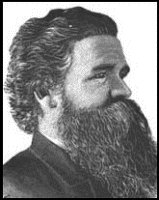 Samuel Fielden
Samuel Fielden
"It is not generally
considered a crime among
intellectual people to be a Revolutionist, but it may be made a crime
if the
Revolutionist happens to be poor."
– Samuel Fielden
Born: February 25, 1847; Todmorden, England
Died: February 7, 1922
Occupation: self-employed teamster
“His rugged appearance and fluent
homespun delivery appealed
to his working-class audiences- he was whole-souled, humorous, full of
quaint
touches of tenderness, simple uncultured poetry, and good-heartedness.”
–Lizzie May Holmes (on Fielden)
The only English immigrant among the
accused defendants in the Haymarket trial, Samuel Fielden
served as the treasurer of the
American Group (a faction of the International Working Persons
Association). A supporter of the 8-hour
movement, Fielden was speaking at the Haymarket when Captain Bonfield
ordered Fielden and the assembled group to immediately disperse. Fielden maintained that the group was
peaceable, but decided to step down from the speaker’s position, anyway. As he was stepping down from the speakers’
wagon, the bomb was thrown into the ranks of policemen.
Fielden was the only defendant who sustained
a major injury at Haymarket--he was shot in the knee by a police
officer as he fled the Haymarket area.
Fielden was
arrested the following morning, at his
home. He stood trial and was convicted
and sentenced to death with the other defendants. Like
Michael Schwab, Fielden chose to write
to Governor Oglesby, pleading that his death sentence be commuted to a
sentence of life in prison. Governor
Oglesby granted this favor, commuting Fielden’s sentence on November 10, 1887.
Fielden
served six years in prison, before being pardoned on June 26, 1893
by
Governor John Peter Altgeld. After being
pardoned, Fielden led a quiet life, eventually acquiring land and
moving
to a ranch in Colorado. He lived the rest of his life on the ranch,
remaining generally inactive in the labor movement, until his death in
1922.
|
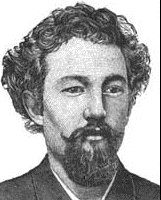
Louis Lingg
“The
forces by which the workers are kept in subjugation
must be retaliated by force.”
– Louis Lingg
Born: September 9, 1864
Died: November 10, 1887
(suicide)
Occupation: carpenter
“Devoted
and fearless, never for an instant allowing
false
hope to swerve him from the path of principle,
he died as he had lived--a child
of nature.”
– Dyer Lum (on Lingg)
Louis Lingg, at age twenty-two the youngest
of the Haymarket defendants,
immigrated to the United States
from Germany
less than one year before the Haymarket incident. In
Germany,
Lingg’s father was hurt in
an accident, and his father’s employer reduced his wages and eventually
discharged him; this gave Lingg a poor impression of employers and set
off his
militant hatred of capitalism. He
discovered socialism in 1881, before leaving for the United States.
Once in America,
Lingg joined the North-Side Group, along with Neebe and Schwab. Lingg was extremely militant, and together
with
William Seliger, made 30 to 50 bombs on the day of the Haymarket
incident. Although Lingg did not attend
the Haymarket
meeting, he was eventually arrested on May 14, 1886 when a police officer came
to Lingg’s hiding
spot. Lingg fought the police officer before finally being
subdued by his
landlord, who witnessed the struggle.
In 1886, a jury convicted Lingg and sentenced
him to death, along with the
other Haymarket defendants. On November 6, 1887,
less than
one week before his scheduled execution, four bombs were found in
Lingg’s
cell. This prompted the city of Chicago to fear
either an
escape or an attack by the defendants and caused serious harm to the
defendants’ public opinion and support. On
November
10, 1887,
the day before his scheduled execution, Lingg smuggled dynamite caps
into his
cell and bit them, destroying his jaw, and killing himself. Many believed that he did not want his fate
to be in the hands of his oppressors, and that he would rather be a
martyr for
the cause, by his own volition.
|
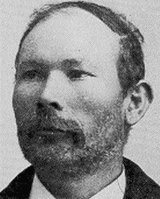
George Engel
“No power on Earth can rob the
working man of his knowledge
of
how to make bombs- and that knowledge he possesses.”
--George Engel
Born: April 15, 1836
Died: November 11, 1887
Occupation: toy store owner
George
Engel, 50 years old at the time of the Haymarket
riot, was the oldest of the Haymarket defendants. An
orphan since the age of 12, Engel
immigrated to America
from Germany
in 1873. Engel became a socialist
shortly after arriving in Chicago
in 1874. His adoption of socialism was influenced by what he saw
as the sameness of the two major parties: "When, in the
fourteenth ward, in which I lived and had
the right to vote, the Social Democratic party had grown to such
dimensions as
to make it dangerous for the Republican and Democratic parties, the
latter
forthwith united and took stand against the Social Democrats.
This, of
course, was natural; for are not their interests identical?"
A
militant, “fervent devotee” of the International Working
Persons Association, Engel, along with Fischer, was a radical leader of
the
autonomist faction of the socialist labor movement.
In the words of co-defendant Oscar Neebe, “Engel was
a brave soldier in the working-class struggle, an
out and out rebel for the cause.” Although Engel
attended the “Monday Night
Conspiracy” at Greif’s Saloon on May 3, 1886, Engel stayed at home and
played cards on the night of the
Haymarket riot.
He was
arrested at his home two days later. Engel
was convicted and sentenced to death by
hanging. Unlike Fielden and Schwab,
Engel chose not to plead to Governor Oglesby for his sentence to be
commuted. Accordingly, Engel was hanged
on November 11,
1887
with the remaining Haymarket defendants.
|

Adolf Fischer
“He expected and desired to lose his life
in the cause of
human emancipation, and he had little patience with measures looking to
the
mere amelioration of the working people’s condition.”
– William
Holmes
Born: 1858
Died: November 11, 1887
Occupation: printer
Adolph
Fischer was a militant revolutionary zealot and
German-born socialist who immigrated to the U.S. when he was 15 years
old. After arriving in America,
Fischer became the foreman
of the composing room at the Arbeiter-Zeitung. Fischer also joined the International Working
Persons Association and the Lehr-und-Wehr Verein. Along
with Engel, Fischer was a leader of the
autonomist faction of the socialist labor movement.
Fischer
attended the “Monday Night Conspiracy” at Greif’s
Saloon on the night before the Haymarket incident.
He also attended the Haymarket meeting, but
was reportedly at Zepf’s Hall when the bomb was thrown.
He was apprehended the following morning at
the offices of the Arbeiter-Zeitung.
Fischer
was convicted and sentenced to death by
hanging. At his sentencing, Fischer blamed
the verdict on the jury's hatred of his ideas: “I was tried here in
this room for murder, and I was
convicted of Anarchy.” He predicted the verdict
would not end anarchy, but only lead to more of it: “The more the
believers in just causes are persecuted, the
more quickly will their ideas be realized. For
instance, in rendering such an unjust and barbarous
verdict, the
twelve ‘honorable men’ in the jury-box have done more for the
furtherance of
Anarchism than the convicted have accomplished in a generation. This verdict is a death-blow to free speech,
free press and free thought in this country, and the people ill be
conscious of
it, too. This is all I care to
say.” Fischer did not plead for
his
sentence to be commuted, and if he had, his appeal would have likely
failed. Accordingly, Fischer was hanged
on November 11,
1887
with Parsons, Spies, and Engel.
|
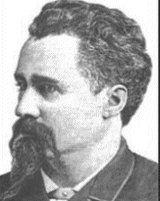
Oscar Neebe
“Neebe was an
organizer, pure and simple. An adept at
collecting men together and
lining them up into workable bodies, he was an able ally for the
educators, as
innocent of wrong as the others.”
– Lizzie Holmes.
Born: July 12, 1850
Died: April 22, 1916
Occupation: part-owner of a
yeast company
Neebe,
along with Parsons, is one of only two American-born
defendants in the Haymarket trial. Shortly
after birth in New York City,
Neebe and his family
moved back to Germany
where
they stayed, before returning to America shortly before the
Haymarket incident.
Neebe was never
considered a leader of the Socialist
movement, but he remained to play an important role in organizing the
movement. He offered this criticism of capitalism:
"You use your power to perpetuate a system by which you
make your money for yourselves and keep the wage workers poor... You
rich men
don't want the poor educated. You don't want anybody to be
educated. You want to keep them down in the mud so you can
squeeze the
last drop out of their bones."
Neebe was not present at the
Haymarket, but attempted to revive the Arbeiter-Zeitung after
the riot had caused many involved with the Arbeiter-Zeitung
to be arrested.
After
being arrested himself and tried with the other defendants,
Neebe was the only defendant who escaped a death sentence. He was
sentenced to 15 years in prison. Neebe was pardoned on June 26, 1893 by
Governor Altgeld.
|
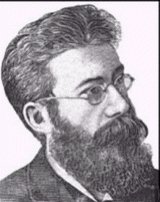
Michael Schwab
“His revolutionary tendencies were of a mild
character; his
was not of a nature to get violently
aggressive.”
- Lucien S. Oliver,
chair of the Haymarket Amnesty Association.
Born: August 9, 1853
Died: June 29, 1898
Occupation: bookbinder
Michael
Schwab was a 32-year old German
immigrant and
brother-in-law of Rudolph Schnaubelt (the man suspected of throwing the
bomb that caused the Haymarket riot). After
immigrating to America
in 1879, Schwab became an
active fighter for labor rights. Once a
member of the Socialists Labor Party, Schwab left the group to help
found
another labor rights group, the North-Side Group. Schwab
began writing for the Arbeiter-Zeitung in 1881 and
eventually
became its associate editor. Schwab was
considered to be a milder type of revolutionary who was not quite as
inflammatory in his speeches and writings as some of his colleagues.
As
the associate editor of the Arbeiter-Zeitung and
supporter of the 8-hour labor movement, Schwab
wrote an article on May
4, 1886, calling for the need of resistance against the
capitalists. That night, Schwab attended
the beginning of
the Haymarket meeting, but had left and was speaking at the Deering
Reaper
Works at the time of the explosion.
Schwab
was arrested the following morning at the offices of
the Arbeiter-Zeitung. In
the trial, Schwab sought to distinguish anarchy from the violence with
which it was so often associated: “It is entirely wrong to
use the word Anarchy as synonymous
with violence. Violence is one thing and
Anarchy another. In the present state of
society violence is used on all sides, and therefore we advocated the
use of
violence against violence, but against violence only, as a necessary
means of
defense.” He also used the forum
to predict the eventual triumph of socialism: “I know that our
ideal will not be accomplished this or next
year, but I know that it will be accomplished as near as possible, some
day, in
the future.” Schwab was convicted and sentenced to
death, but he wrote a letter to Governor Oglesby, pleading for his
sentence to be commuted to a life sentence. The
letter was successful and his sentence was commuted on November 10,
1887.
Schwab served only six
years in prison before Governor
Altgeld pardoned Schwab, Neebe, and Fielden on June 26, 1893.
|
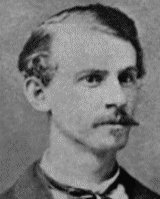
Albert Parsons
“Toward any individual in danger or distress,
he had an
instinctive sympathy.”
– Charles Edward Russell
Born: June 20, 1848
Died: November 11, 1887
Occupation: printer
Albert
Parsons, 37 at the time of the Haymarket riot, had
the deepest American roots of all of the accused Haymarket conspirators. His ancestry can be traced back to 1632, when
his ancestors arrived in America
on the second voyage of the Mayflower. His
family was involved in many social revolutionary
causes, and Albert
continued this tradition by fighting for labor reform in America,
beginning in the early
1870’s.
Husband of
a former slave, Parsons had previously fought for
the rights of Black American citizens and former slaves.
Parsons equated the plight of the working
class to the plight of slaves before slavery was abolished in America. He believed that once traditional slavery was
abolished, capitalism created a new kind of slavery, where the working
masses
were slaves to their capitalist masters. Parsons wrote, “The
working people thirst for the truths of Socialism and
welcome their utterance with shouts of delight.”
Parsons
and his wife, Lucy, arrived in Chicago
in 1873 and became a leader of the
Socialist Labor Party. Parsons eventually
founded the American Group of Chicago,
which was the American branch of the International Working Persons
Association. Parsons was also the editor
of The Alarm, the English version of
the Arbeiter-Zeitung.
Parsons
was invited to speak at the Haymarket on May 4, 1886 and arrived at
the Haymarket around 9 PM. He spoke for almost an hour, before leaving
for Zepf’s Hall, during Samuel Fielden’s speech. He
was at Zepf’s when the bomb exploded in
the Haymarket. Knowing that the police
would immediately search for him, Parsons left Chicago
by train at midnight,
heading for Geneva,
Illinois to stay
with compatriot William
Holmes. Parsons further evaded the
police, shortly after his arrival in Geneva,
by
traveling to Waukesha, Wisconsin,
where he stayed with the Hoan
family, whose father sympathized with Parsons’s beliefs.
Parsons
stayed in Wisconsin
until the first day of the Haymarket trial, June 21, 1886.
He surrendered by dramatically and unexpectedly entering
the
court. He, along with six others, were
convicted at trial and sentenced to death. Despite
pleas to do so, Parsons did not write to Governor
Oglesby to have his sentence commuted. Many
believed that, had he asked, Parsons would not have
been
executed. Parsons felt that the only
way to save the others was to align himself with them.
Because of this insistence to have the same
fate as the others, he was hanged with them on November 11, 1887.
|
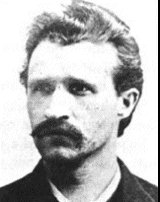
August Spies
He was “handsome and intelligent, with a wide range
of
reading
and of studious nature, with a warm heart controlled by a cold,
philosopher’s brain.”
- Dyer Lum
Born: December 10, 1855
Died: November 11, 1887
Occupation: Upholsterer
August
Spies (pronounced Speeze in English), 30 at the time
of the Haymarket incident, was a
German
immigrant who came to America
in 1872. Considered to be an excellent
writer, Spies was fluent in English, German, and French.
In
Chicago,
Spies was a member of the Lehr-und-Wehr Verein and Socialists Labor
Party. He was also the business manager of
the Arbeiter-Zeitung, the German-language
newsletter for the working class. Many
considered Spies to be nearly an equal to Parsons in the anarchist
movement in Chicago.
Spies
witnessed the incident at the McCormick factory on May 3, 1886, where
a
skirmish broke out between the police and workers.
Two people were killed, prompting Spies to
write and publish the “Revenge Circular.” The
Arbeiter-Zeitung printed
approximately 2,500 copies of the circular, and half were distributed
to the
public. The circular called for the
working
class to take up arms and exact revenge on their oppressors, the
capitalists.
Spies was
the first speaker at the Haymarket on May 4, 1886. He
spoke while the crowd waited for Parsons
to arrive. By all accounts, Spies’s speech was mild and was not likely
to
incite violence. He remained for the conclusion of the meeting and was
stepping
down from the speakers’ wagon when the bomb was thrown into the crowd.
Spies
was arrested the next morning (May 5, 1886) at the offices of the Arbeiter-Zeitung,
along with Fischer and
Schwab. While in prison, Spies began a
romance with Nina Van Zandt, eventually marrying while in prison. Spies also did not write a plea to Governor
Oglesby. Even if he had, Governor
Oglesby would likely not have commuted the sentence.
Spies was hanged on November 11, 1887. On the
scaffold, Spies offered a prediction: “The time will come when our
silence will be more powerful
than the voices you strangle today.”
|